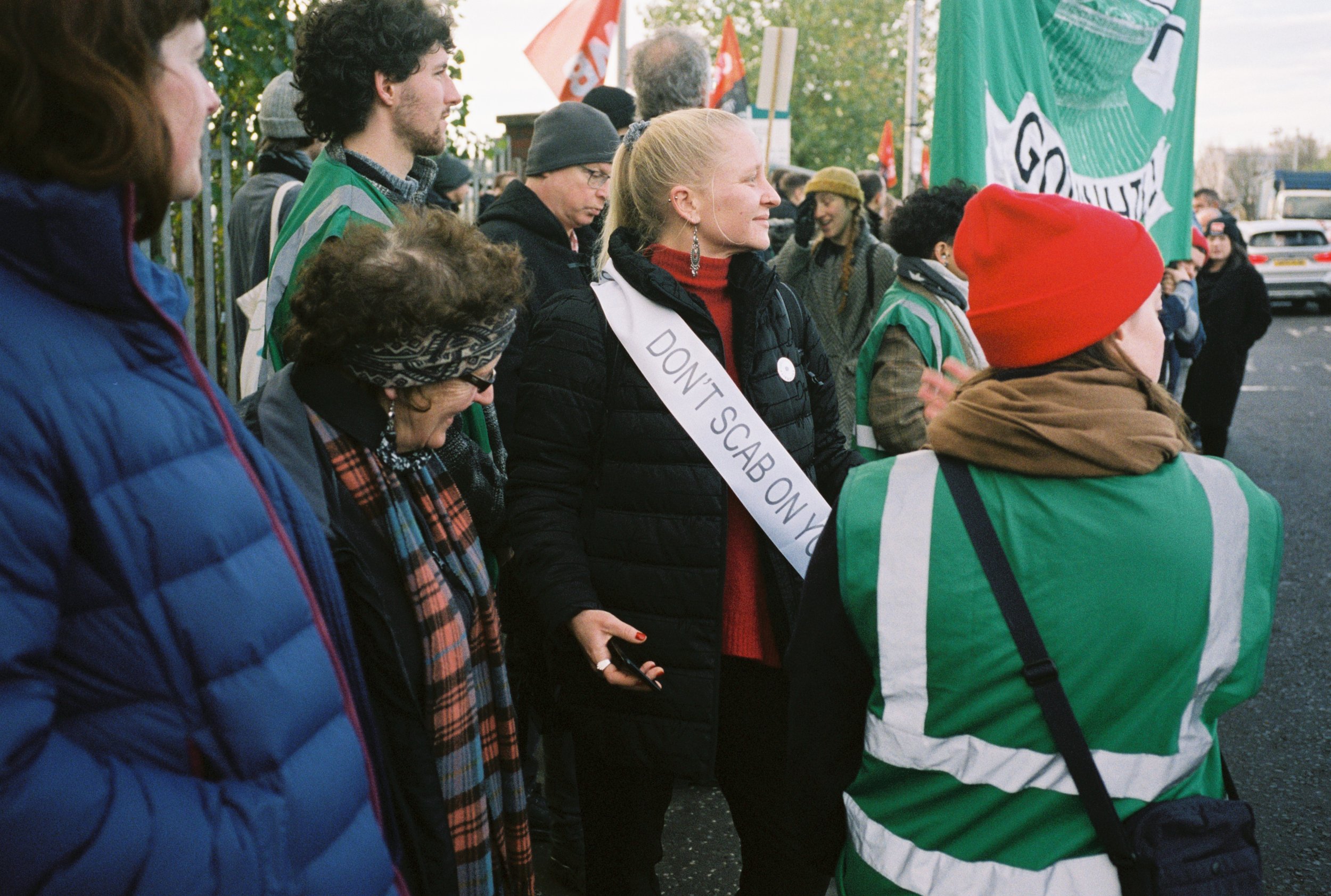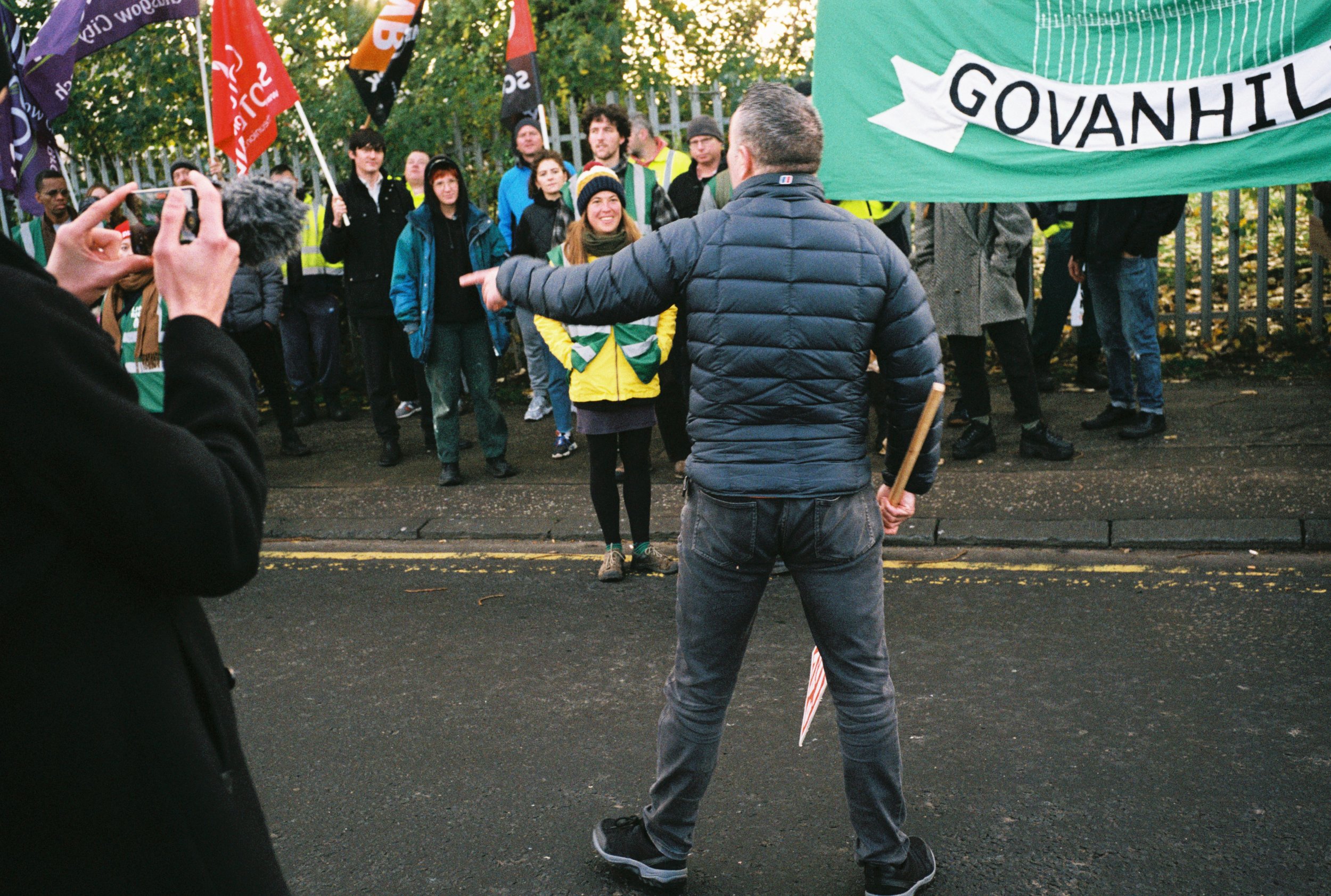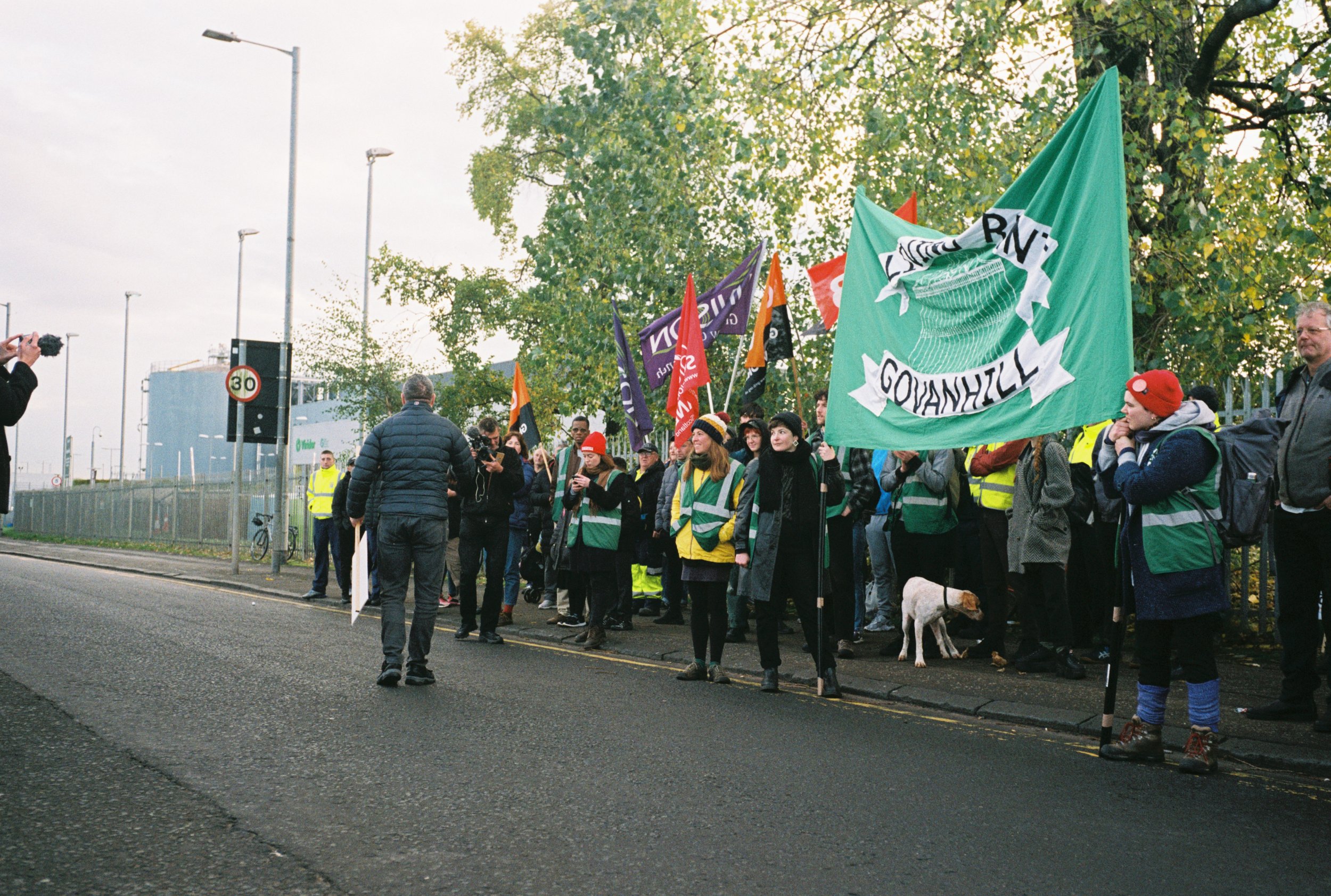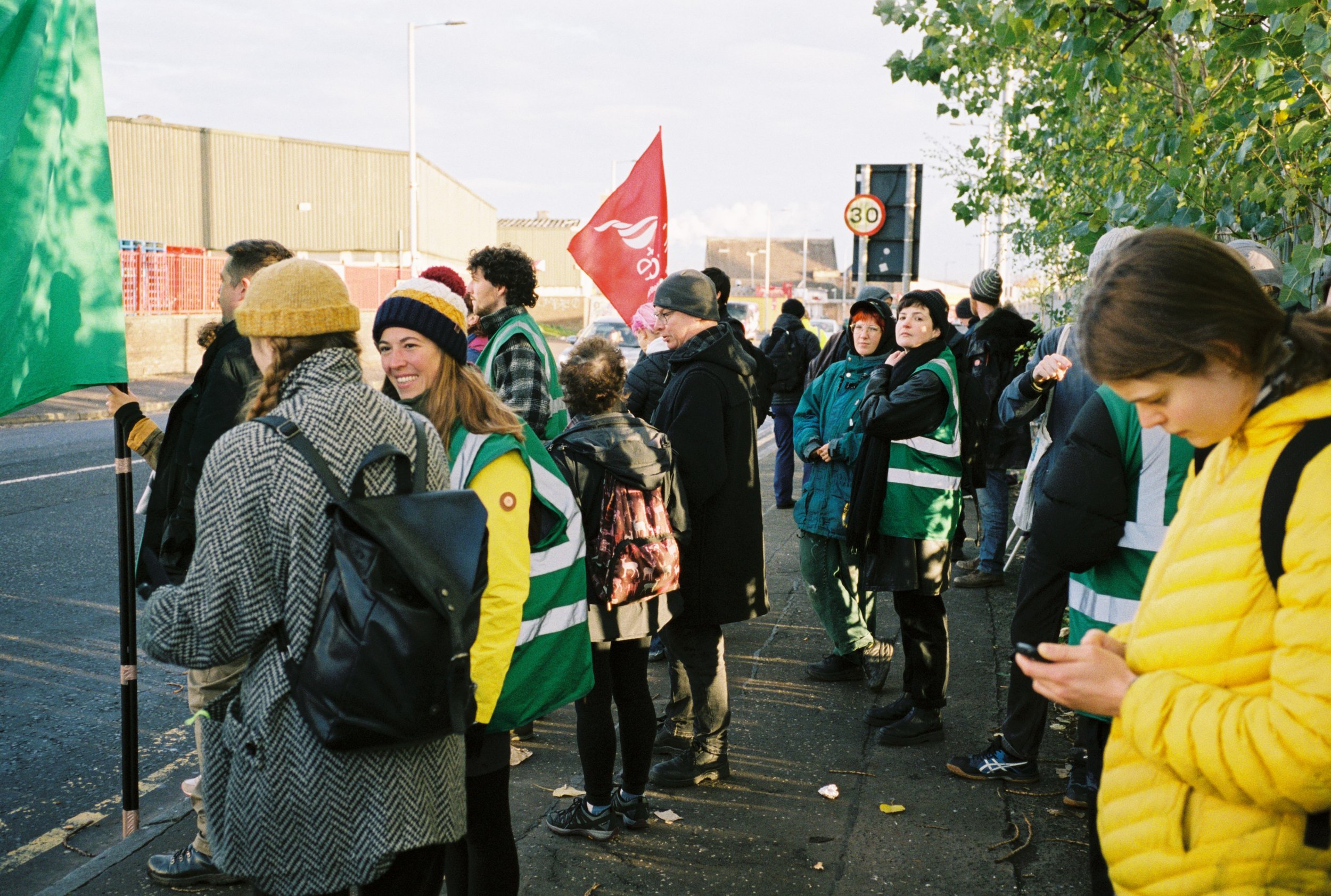Exploring Solidarity in Glasgow and Beyond
As more and more strike actions take place in response to unjust conditions, we revisited this article from Issue 5 of the magazine, in which Silas Lehane explored solidarity between interconnected struggles.
By Silas Lehane
Photos by Chris Moses
Amidst the frenzy that COP26 brought when it descended on Glasgow, refuse collectors of the GMB trade union went on strike. After a deal with employer COSLA fell through at the 11th hour, members walked out over a long-running dispute concerning low pay, declining working conditions and deteriorating workplace facilities. Whilst rubbish collectors and street cleaners formed picket lines outside Glasgow’s refuse centres, reports came in that Glasgow City Council was planning to undermine the strike by drafting in new workers. When news of the threat of strike-breaking spread, a motley crew of supporters across Glasgow rallied to their cause.
At Polmadie depot, members of the tenants’ union Living Rent, alongside residents from Govanhill turned up to show their support. Over at the Blochairn waste facility, youth climate activists from Fridays for Future joined the lines, leading chants to boost morale. Living Rent’s statement called attention to their shared commonality in both groups’ causes: ‘The city’s residents and workers want the same thing – a clean city brought about by proper investment and a happy workforce.’
Read ‘Why Unions’, an extract from Make Bosses Pay by Eve Livingston
There might appear little in common between the aims of trade unions, environmental activists and a tenants’ rights organisation, but what these groups showed was a steadfast display of solidarity to one another. Solidarity is essential to collective action, a means to look beyond our immediate personal circumstance to demonstrate our support for one another’s struggles. ‘Stand with us, not against us!’, a rallying cry of the GMB unrest, seems a pertinent encapsulation of this. By making vocal their agreement with the refuse collectors’ cause, and encouraging others to do so too, solidarity as an abstract political principle was transformed into a practical commitment.
The 2014 film Pride is a powerful retelling of solidarity in action. It depicts the story of Lesbian and Gays Support the Miners who came to the financial aid of Welsh mining communities during the Miner’s Strike of 1984. Despite their cultural differences, these communities forged friendships and a shared political understanding through selfless displays of support across geographic boundaries. Here, solidarity seems most effective when there is a shared enemy to be confronted – in this case, both miners and the LGBTQ community were political targets of Thatcher’s government.
Solidarity with GMB strikers is far from the only such instance, as COP26 demonstrated vividly. The conference came amidst a sense of growing labour disquiet in the city, with workers in the transport, education and legal sectors organising to fight exploitation in the workplace. As the international community arrived, and the world’s media turned its attention to the city, activists and organisers saw the opportune moment to elevate their causes’ platform, ushering in a flurry of protest and direct action.
During the conference, Fridays for Future Glasgow was particularly notable for the tireless energy its members put into showing solidarity. As well as forging connections with GMB, they supported many others, bolstering the lines at a picket by rail union RMT outside Central Station, when drivers on the Caledonian Sleeper were protesting for a genuine pay rise.
It is impresive how a group so young – both its members and the organisation itself – have so clearly perceived and articulated the inter-connections of their own environmental cause with the likes of labour. It is the grave, overarching threat of environmental catastrophe that makes climate justice a powerful medium through which different groups might organise together, finding common ground to cooperate between their specific struggles.
This is something too that Living Rent’s style of activism has honed in on. Living Rent’s rapid growth has seen it develop a holistic understanding of the housing crisis as deeply interwoven with other sites of socio-political struggle. The union’s work with GMB began prior to COP26, when collaborating to confront Glasgow’s waste crisis. In October, Living Rent members collected overflowing litter from Govanhill, Partick, Govan and Dennistoun, dumping it temporarily outside the council offices in George Square. GMB organiser Chris Mitchell gave a rousing speech to onlookers about the policies of privatisation that have produced the crises of cleanliness and housing in the city – placing blame directly with Glasgow City Council – and the importance of working together to challenge the council’s failure to adequately fund services.
Read how Living Rent are Taking on the Council with Neighbourhood Power
In Glasgow, protest and civil unrest have strong historic roots, stretching well back to the Red Clydeside era of the early 20th century. The city was a hotbed of revolt in the war period, with labour agitation in the city’s dockyards, anti-war protests and women-led rent strikes. The city’s long-standing political identity has not only struggled to improve its own lot, but moreover sought to recognise and support political struggles further afield.
In 1974, engineers at the East Kilbride Rolls-Royce factory refused to service fighter jets from the Chilean air force, a year after Pinochet had seized power. Their actions effectively grounded Chile’s air force, and as the moving documentary Nae Pasaran tells, helped inspire hope in the country’s fractured opposition. The courage of these workers who showed international solidarity at their own risk was only recognised many years later. These actions suggest the potency of looking beyond the immediate, to consider how actions taken in one place might shape events far across the globe.
By seeking the interconnections of our struggles, however distant, abstract or minimal they may seem, solidarity looks to the long-term horizons of our social and political lives. These fights are won when people and communities work together, and an issue for one group now may soon be an issue for us all. As actors in Glasgow have shown, by challenging us to think beyond ourselves, solidarity is not only a feeling, but an essential tool for collective action for now and years to come.




